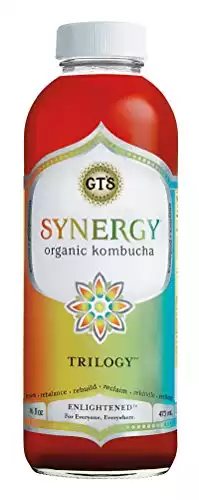While hard kombucha is known to have alcohol in it, does hard kombucha have caffeine? Let’s find out.
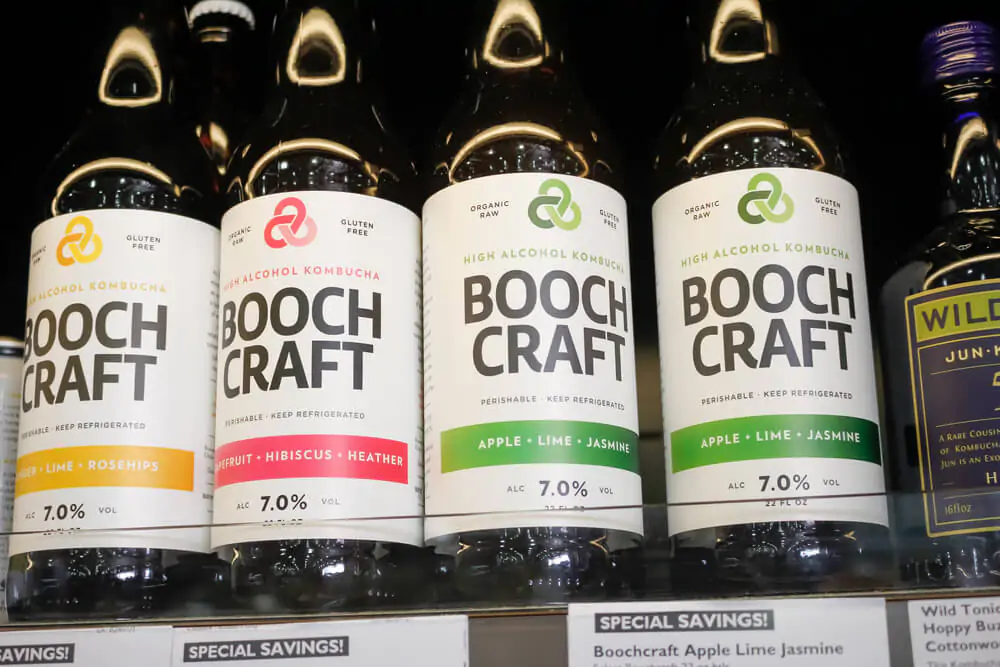
Since many people drink hard kombucha as a pick-me-up, it seems like it might have caffeine. Hard kombucha is made from tea leaves, so it will always be caffeinated, at least slightly.
However, compared to other caffeinated drinks out there, hard kombucha contains far less caffeine. A regular serving of hard kombucha only contains around 15 mg of caffeine, which is hardly enough to feel anything, especially for people who love drinking coffee.
The amount of caffeine in hard kombucha will also depend on the brand. Some companies add more caffeine to their products, while other companies keep their products at the natural level.
What Is Hard Kombucha?
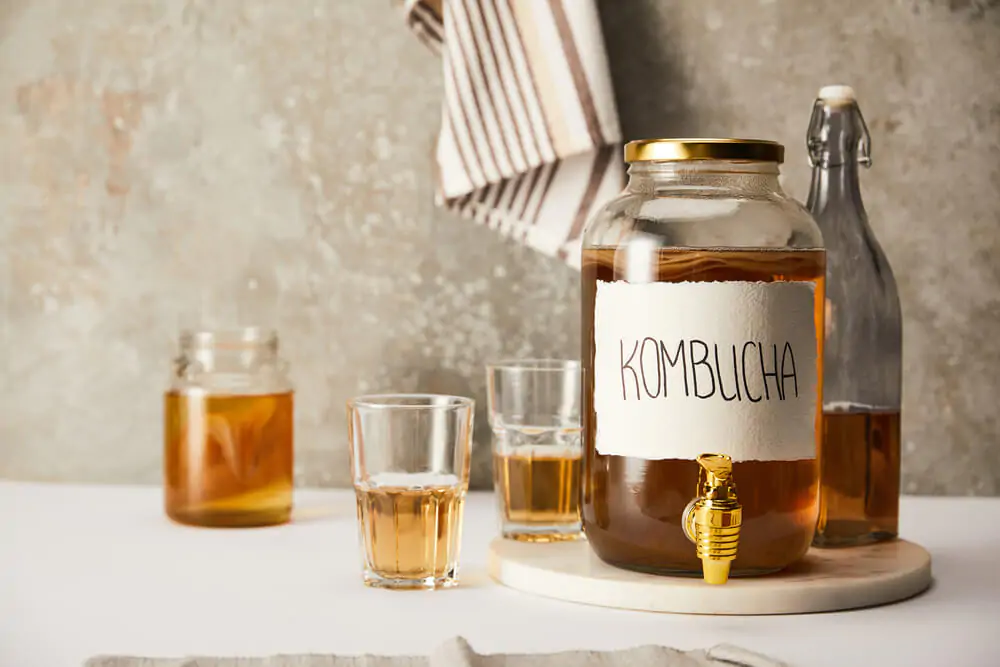
Kombucha is simply a fermented tea beverage that is associated with many potential health benefits. Commercial kombucha is advertised as a non-alcoholic drink; however, home-brewed kombucha can have considerably higher alcohol content and pose health risks if made improperly.
Hard kombucha is also made from simple ingredients such as tea, sugar, bacteria, and yeast. The biggest difference regarding kombucha and hard kombucha is how much sugar is added, the kind of yeast used, and how long it was fermented.
Hard kombucha may need longer fermenting cycles than commercial kombucha, which requires one to two. Companies add more sugar and yeast during the later stages of fermentation to continue fermenting the beverage and increase its alcohol content. Hard kombucha often has the same amount of alcohol as a beer — some are as light as lagers, while some are as strong as IPA beers.
Check out our explainer on does hard kombucha expire.
Caffeine And L-theanine
The caffeine in both tea and coffee isn’t actually the same. Both drinks contain caffeine, but tea is beloved for being soothing, while coffee provides an energy boost.
L-theanine, which is an amino acid that eases anxiety and acts as a natural relaxant, is also present in tea. According to studies, L-theanine counteracts caffeine’s ability to boost energy because it promotes calming alpha brain waves.
L-theanine and caffeine can improve mood and academic performance. It can make you feel more alert and boost memory function,
How Much Caffeine Does Hard Kombucha Have?
After the fermentation process, only a third of the caffeine may be left. So, an eight-ounce cup of hard kombucha made from green tea will contain 10 mg of caffeine out of the original 30 mg.
It’s hard to determine the exact amount of caffeine because it can be altered depending on different factors. You may also be interested in reading our guide on how much caffeine is in a cup of tea?
Factors That Influence The Caffeine In Hard Kombucha
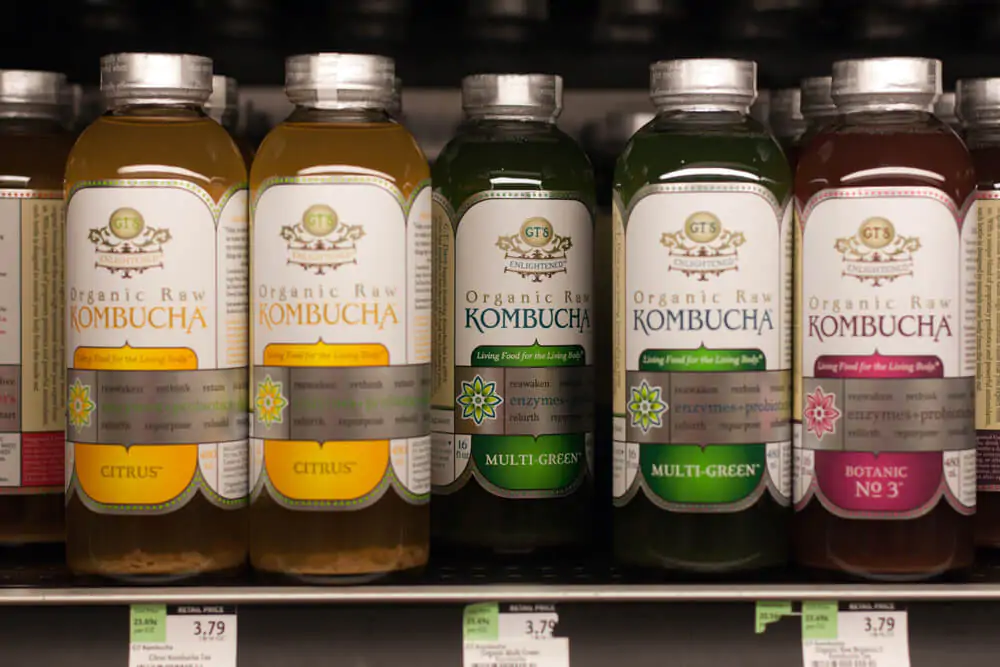
The caffeine content is influenced by the amount of caffeine in the brewed tea. Compared to a regular cup of coffee, which has 75 to 80 mg of caffeine, most tea varieties contain significantly less caffeine — about 25 to 30 mg. However, this amount will also depend on other factors, such as:
- The length of time you the tea was steeped. Tea is stronger when it has been steeped longer.
- How long you ferment the kombucha. The caffeine is broken down naturally by the bacteria colonization.
- If caffeine was added. Some kombucha brands have ingredients that naturally contain caffeine or have had caffeine added; always read the label.
How To Reduce The Caffeine In Hard Kombucha
If you are worried about your caffeine intake – because you drink coffee or you consume hard kombucha regularly – there are several ways to reduce the caffeine.
Pick Teas That Are Low In Caffeine
Check the caffeine levels in the base tea, especially if you want to brew your own hard kombucha. Choose teas with 40 to 60 mg of caffeine if you want to cut down but not fully cut out caffeine. There are also decaffeinated teas available — look for hard kombucha processed with water or carbon dioxide since they won’t affect fermentation.
Pay Attention To How Long You Steep The Tea
How long you steep your tea determines the flavor and caffeine content. Steeping for less reduces the caffeine, and steeping for longer increases it.
The water temperature also makes a difference. Hot water means more caffeine seeps in, so you can let the water cool for a few minutes for a less caffeinated cup.
Always read the label
Always inspect the label to see if the caffeine content is listed. In most cases, the caffeine content is listed at the back of the label, where the name of the product, manufacturer, and flavors are documented.
In many of the best kombucha brands, such as GT’s and Health-Ade, the caffeine content is listed on the bottle, but it can sometimes be difficult to find due to the designs on the label.
16.2 Ounce (Pack of 12)
Inspect All The Ingredients
The caffeine in hard kombucha may vary depending on the amount of added sugar, natural or artificial flavorings, and fermented ingredients such as apple cider vinegar. In addition, the rate at which caffeine is metabolized can be increased by nicotine.
Consume Less
Different types of kombucha have different amounts of caffeine. If you are concerned about your caffeine intake, make sure to look for the listed caffeine content on every bottle as well as the other ingredients that may affect the caffeine content.
You can also reduce your caffeine intake by drinking a smaller portion or selecting caffeine-free drinks.
Is Drinking Hard Kombucha Safe?
Tea and coffee both naturally contain caffeine, which is a stimulant of the central nervous system. Caffeine has been used for many years to combat fatigue and increase alertness.
About 80% of adults in North America consume one type of caffeine. Although caffeine is considered safe, there are still some minor risks associated with it.
For example, consuming caffeine regularly can lead to addiction. If you cannot start your morning right without having a cup (or two or three) of tea or coffee, and you get headaches when you need a pick-me-up in the middle of the day, then you know what we are talking about.
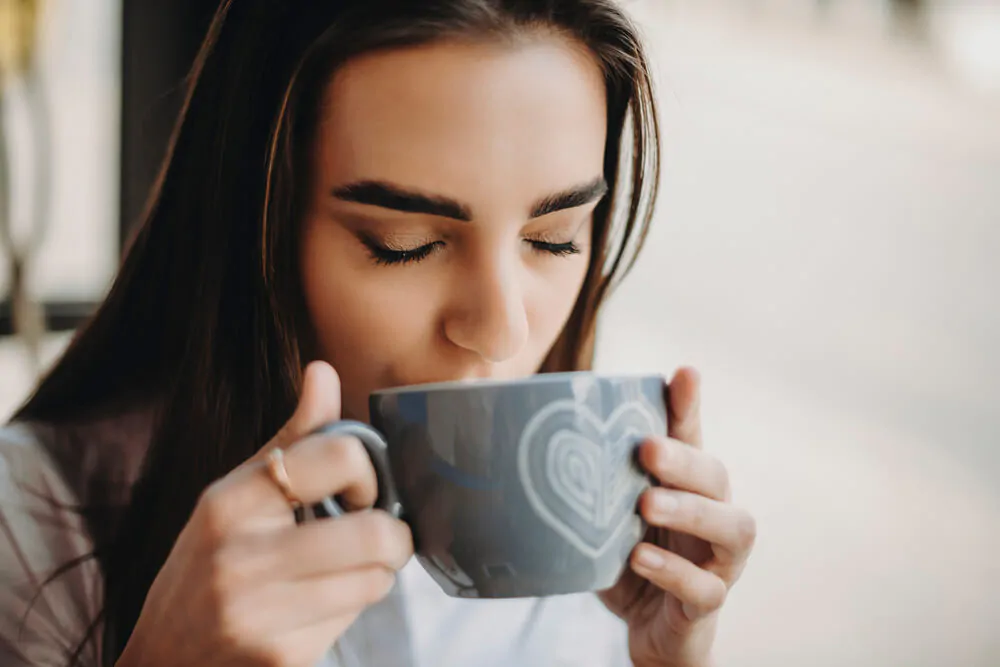
So, is drinking hard kombucha every day safe? As mentioned earlier, a regular serving of hard kombucha only contains about 15 mg of caffeine, which is less than coffee, soda, and energy drinks.
Kombucha or hard kombucha is safe to drink. You may also be interested in reading our guide on is hard kombucha gluten-free?
